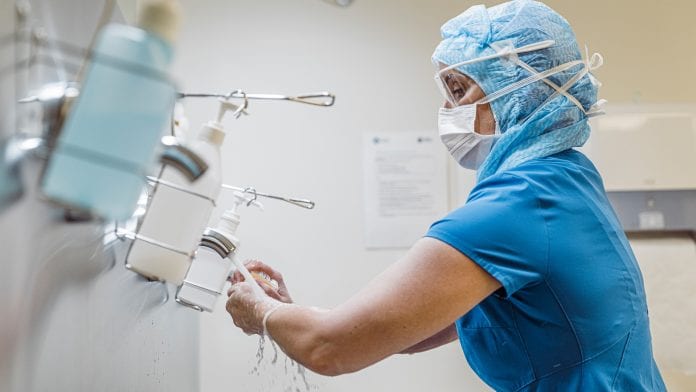
SureWash, the Irish tech company, have stepped into the world of augmented reality apps and launched an interactive software system helping to promote safe hand hygiene.
In light of the rapid spread of COVID-19, SureWash have designed an interactive software system that uses augmented reality and is a scientifically validated training technology for the World Health Organization (WHO) hand hygiene protocol. With social distancing and keeping on top of general hygiene being a critical factor to fight the spread of the infectious virus, implementing safe hand hygiene has just been made easier for health professionals and the general public with SureWash’s augmented reality hand-washing app.
Promoting safe hand hygiene for all
Being a founding member of WHO Private Organisations for Patient Safety (POPS), which has the goal of assisting the WHO to promote safe hand hygiene in healthcare, SureWash have created the innovative augmented reality app to ensure health professionals, workers and the general public are correctly washing their hands.
The company is working with The Learnovate Centre, one of Europe’s leading research centres in learning technologies, to develop new innovative ways of delivering its products. Based at Trinity College Dublin, Ireland, Learnovate is an industry-led technology centre, funded by Enterprise Ireland. SureWash, which is essentially a spin-out from Trinity College Dublin, has already been working with 200 hospitals and a range of sports organisations across the world helping them implement hand hygiene training systems through the SureWash kiosks.
However, with the arrival of the coronavirus, the SureWash Hand Hygiene App, which is a replica of the kiosks used to train healthcare staff, was launched so hospitals can use this as a quicker extension of the training they were already engaged in. The app is also aimed at employers to protect their workplaces, especially those in the pharma and food production industries.
Co-founder and CTO Professor Gerard Lacey said: “We started by developing kiosks that hospitals used to train staff without needing to remove them from the workplace to attend training. It also gives them access to instant data on proficiency in hand hygiene technique.”
How does the app work?
The app uses live video to measure an individual’s handwashing technique and then provides real-time feedback on their proficiency.
With repeat use, the user’s muscle memory learns the correct actions and the WHO standard of washing hands will become second nature to them. Studies have shown that it takes approximately 23 practice sessions over two weeks to build the muscle memory to master the technique.
By gamifying the learning process, SureWash makes developing the muscle memory easier and more fun. Once the technique has been mastered hand hygiene compliance rates can increase by as much as 50%
Lacey explains this further: “We use gamification and augmented reality to record the movement of the hands and give feedback on what they are doing correctly or incorrectly. Once they have done this process between 17 and 25 times, it will go into their muscle memory. The app tests your skills objectively as we can often convince ourselves we are doing it right, but we are missing parts that harbour microbes.
“The messages currently going around about singing the happy birthday song when washing your hands or doing it for 20 seconds are a good first step as it is better for people to be doing something rather than nothing. However, we believe that if you are going to do it, you should do it right.”
Director of The Learnovate Centre Nessa McEniff added: “Successful learning happens when learners implement what they’ve learned in the real world. Gamification helps learners stay interested and real-time feedback ensures correct technique. The final step happens when learning becomes so embedded that the behaviour becomes automatic.”
“The most common place for microbes to breed are on the fingertips”
Lacey added: “The most common place for microbes to breed are on the fingertips, which are often missed when people wash hands. And we typically touch our faces, usually with our fingertips, between 16 and 20 times per hour.
“This should be a process that we continue during the regular flu season even when this pandemic is over. During flu season, one in three staff bring home the flu to their children. However, if we wash our hands regularly and correctly, studies have shown that we can cut the number of sick days by 20%.”
Want to download the app and get started? Check out the details below:
Download via: The Apple store
Download via: The Android App store
























